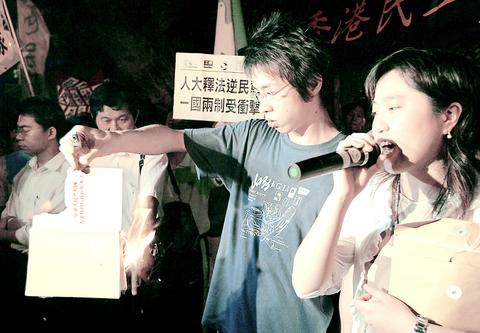China has told the US and former colonial master Britain to mind their own business over its refusal to allow full democracy for Hong Kong any time soon.
"We are Chinese," Foreign Minister Li Zhaoxing (李肇星) told reporters in Shanghai yesterday after Washington and London criticized Beijing for blocking political reform.
"Are you clear on that? Hong Kong is China's Hong Kong."

PHOTO: REUTERS
Li added: "Do you think Hong Kong was democratic under British rule? Did the British raise concerns about that? Did the Americans raise concerns? No. Why don't you take a look at this double standard?"
China's most powerful legislative panel told Hong Kong citizens in a ruling on Monday that they cannot democratically choose a successor to unpopular Chief Executive Tung Chee-hwa (
Beijing also said Hong Kong will be allowed to directly elect only some, and not all, its lawmakers in 2008.
Many Hong Kongers, who want a fully democratic political system for the territory, have responded with a mix of defiance and resignation.
Student activists burned a copy of Hong Kong's mini-constitution, the Basic Law. Pro-democracy lawmakers chanted slogans and unfurled a banner before storming out of a meeting with a top mainland legislative official.
The Standard newspaper yesterday lamented "a sad day for China."
"Yesterday's ruling from the Standing Committee of the National People's Congress that there will be no democracy for Hong Kong was bad enough," The Standard wrote in an editorial. "The way it was delivered showed contempt for Hong Kong's people. Tragically, the ruling also mocks China's desire to be one of the world's trusted leading nations."
Critics say the decision violates China's agreement to grant Hong Kong a great deal of autonomy after the former British colony was handed back in July 1997.
Beijing said full democracy remains a goal for Hong Kong, but that a quick shift to universal suffrage poses too many risks of social and economic instability.
The US Department of State disagreed, saying international confidence in Hong Kong is based on its rule of law and a high degree of autonomy.
"We're disappointed by the decision, as we believe it doesn't adequately reflect the expressed wishes of the Hong Kong people for universal suffrage and democracy," State Department spokesman Richard Boucher said in Washington.
British Foreign Office Minister Bill Rammell said in London that Beijing had acted inconsistently with its handover promises.
Many Hong Kong residents had expected Beijing to clamp down, but they still were disappointed.
"Hong Kong doesn't want to fight with the central government," said Dolby Tong, a 32-year-old shipping salesman. "We just want to choose our own government which reflects citizens' voices."
Ordinary Hong Kongers now have no say in choosing their leader. They will get to pick 30 of the 60 legislators here in September, but they won't get to elect more than half any time soon, Beijing ruled. The rest are picked by special interest groups, such as businessmen and bankers, who tend to side with Beijing.

Indonesia yesterday began enforcing its newly ratified penal code, replacing a Dutch-era criminal law that had governed the country for more than 80 years and marking a major shift in its legal landscape. Since proclaiming independence in 1945, the Southeast Asian country had continued to operate under a colonial framework widely criticized as outdated and misaligned with Indonesia’s social values. Efforts to revise the code stalled for decades as lawmakers debated how to balance human rights, religious norms and local traditions in the world’s most populous Muslim-majority nation. The 345-page Indonesian Penal Code, known as the KUHP, was passed in 2022. It

‘DISRESPECTFUL’: Katie Miller, the wife of Trump’s most influential adviser, drew ire by posting an image of Greenland in the colors of the US flag, captioning it ‘SOON’ US President Donald Trump on Sunday doubled down on his claim that Greenland should become part of the US, despite calls by the Danish prime minister to stop “threatening” the territory. Washington’s military intervention in Venezuela has reignited fears for Greenland, which Trump has repeatedly said he wants to annex, given its strategic location in the arctic. While aboard Air Force One en route to Washington, Trump reiterated the goal. “We need Greenland from the standpoint of national security, and Denmark is not going to be able to do it,” he said in response to a reporter’s question. “We’ll worry about Greenland in

PERILOUS JOURNEY: Over just a matter of days last month, about 1,600 Afghans who were at risk of perishing due to the cold weather were rescued in the mountains Habibullah set off from his home in western Afghanistan determined to find work in Iran, only for the 15-year-old to freeze to death while walking across the mountainous frontier. “He was forced to go, to bring food for the family,” his mother, Mah Jan, said at her mud home in Ghunjan village. “We have no food to eat, we have no clothes to wear. The house in which I live has no electricity, no water. I have no proper window, nothing to burn for heating,” she added, clutching a photograph of her son. Habibullah was one of at least 18 migrants who died

Russia early yesterday bombarded Ukraine, killing two people in the Kyiv region, authorities said on the eve of a diplomatic summit in France. A nationwide siren was issued just after midnight, while Ukraine’s military said air defenses were operating in several places. In the capital, a private medical facility caught fire as a result of the Russian strikes, killing one person and wounding three others, the State Emergency Service of Kyiv said. It released images of rescuers removing people on stretchers from a gutted building. Another pre-dawn attack on the neighboring city of Fastiv killed one man in his 70s, Kyiv Governor Mykola